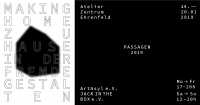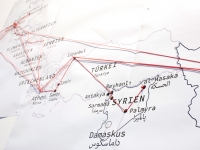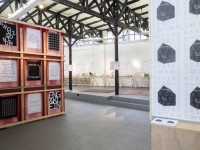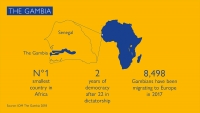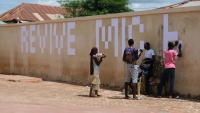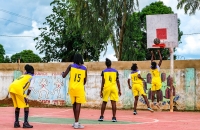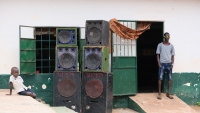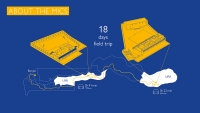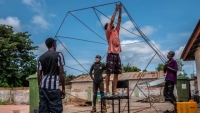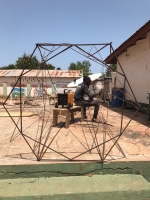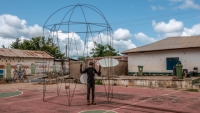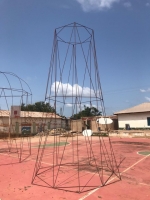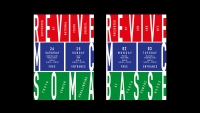Simon Meienberg, Making Home. Zuhause in der Fremde gestalten,MA Thesis, 2019
Supervision: Prof. Dr. Carolin Höfler, KISD, TH Köln
In his MA thesis, Simon Meienberg examines the situation of refugees after their arrival in Germany and asks how they find a new place to live and what role design plays in this. Four refugees from Afghanistan, Syria and Iran dare to compare the home they left behind in their country of origin with their current living situation in Cologne. Accompanied by Simon Meienberg and the architect Heribert Weegen, they visualize their different living environments during a meeting that lasted several weeks. In a creative dialog, they turn their gaze to their home in their homeland. How did they live there, and which memories and images are particularly present? In contrast, they look at their current accommodation. The project addresses the question of what design freedom the new living situations offer and what restrictions are inscribed in the functional architectures. How can the new accommodation be brought closer to the needs and wishes of their inhabitants through their own design interventions?
The MA thesis was accompanied by the research cluster “Echtzeitstadt | Real-Time City” of TH Köln. On the occasion of the Design Festival PASSAGEN 2019, Simon Meienberg presented mappings and models together with ArtAsyl e.V. und JACK IN THE BOX e.V. in the art space of artrmx e.V. in Köln Ehrenfeld.
Organisation: Simon Meienberg
Exhibition design: Simon Meienberg and Heribert Weegen
Location: artrmx e.V. – Atelierzentrum Ehrenfeld; Hospeltstraße 69; 50825 Köln
Opening times: January 14–20, 2019; Mon–Fri 5–8 pm; Sat–Sun 12–8 pm
KISDtalk with Simon Meienberg, Designing Alternative Futures with Migrant Communities in West-Africa, May 6, 2020
While European bureaucracies are still focussing on fighting the symptoms of an ongoing migration towards its heavily defended boarders, grassroot initiatives in West-Africa already work together with local communities to co-create alternative futures to respond to the many reasons young people decide to take the Central Mediterranean route to Europe. Despite a new focus on the sustainable and the local, development cooperation as we know it has yet to reinvent itself. Balancing the fine line between offering support and empowering local individuals and communities, we have to acknowledge that “migrants” are by no means helpless people. They interact on a global scale, organize themselves in networks for mutual support, and constantly look out for opportunities of a brighter future mainly in densely populated urban areas, while navigating between the informal and formal spheres of society. In recent years, the establishment of novel academic programs such as social design, geo-design and public-interest design have challenged traditional design education and motivated many young designers to use their skills for a more responsible, ethical, culturally adapted and engaged design practice. With which roles are we as designers confronted in such a research setting? And which approaches have the potential to level the relationship between the researcher and the researched leading to a mutual exchange of knowledge?
In his talk, Simon Meienberg shared insights in his design research experience and methodological approaches on home making practices of migrant communities in Paris and Cologne and bottom-up initiatives to empower young locals within the EU-IOM Pilot Project Redesigning Migration Information Centres in The Gambia. In the framework of the ‘Building Together Initiative’, he organized several workshops on site in The Gambia. He presented so-called “Bantabas”, Gambian pavilions for social gatherings, which were designed and realized in one such workshop by local youth and returnees. These experimental steel frame constructions are partially covered with textiles by local seamstresses to provide shade and create intimate zones.
Funded by the Digital Learning Transfer Fellowship, Stifterverband & Reinhard Frank Foundation
Simon Meienberg graduated with a Master of European Studies in Design at KISD and complemented his studies at Politechnico di Milano and ENSCI | Les Ateliers in Paris. In his MA thesis in the area of Design Theory and Research, he investigated urban forms of interaction of migrants in Paris and Cologne as strategies for home making in a foreign country. In the context of this work, he organized a participatory workshop and a public exhibition at Atelierzentrum Ehrenfeld, Cologne, which was supported by ArtAsyl e.V. and JACK IN THE BOX e.V. After his MA degree he worked as a design consultant for the IOM – International Organisation for Migration of the United Nations in Gambia.
Images: Simon Meienberg
